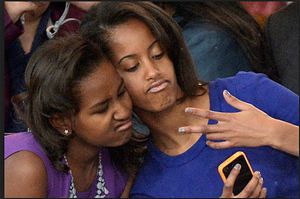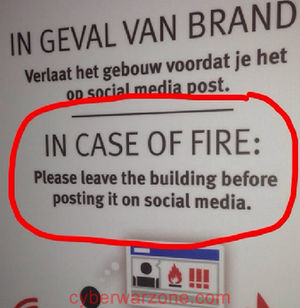User:Mihail Bakalov/Trimester 4/GraduateResearchSeminar
[S-interesting that you upload pictures of people taking selfies- but not of selfies]
The selfie is a sub-category of the self-portrait, which has being practised for a long time, but the term was invented in the past ten years. (source?) A selfie is a photograph taken of oneself, typically with a smartphone or webcam and uploaded to a social media website. The pictures represent one's experiences usually promoting your self in a positive environment and attitude.
[i made a few mini edits here-S]
"The idea of the selfie is much more like your face is the caption and you’re trying to explain a moment or tell a story." [Frédéric della Faille, NY times , http://www.nytimes.com/2013/10/20/sunday-review/my-selfie-myself.html?_r=0 ]
The fascination for our image comes from very early age and play's
an important part of our identity.
Infants by the end their second year start to recognise their image and
establish the perception of their self by looking at their reflection in the
mirror. This is what Jacques Lacan calles "the mirror stage" in his paper “The
mirror stage as formative of the function of the I as revealed in psychoanalytic
experience". [cite and capitalise]The recognition in this phase induces a perception, turning
oneself into an object that the child can view from outside itself.
Afterwards their reflected image takes part as structural element of the
psychic life, which becomes the foundation for the child's social relationships.
PLEASE !!! - RUN THIS THROUGH A SPELL- GRAMMAR CHECKER IN WORD, IT TAKES TWO MINUTES-- THIS IS TOO SLOPPY!!- S] >The selfie becomes such a referance as a reflection of the self. This kind of selfportrait not only acts as a reflection how people see you, but also allows to choose the way to be viewed. A selfie mandatory includes the person taking the picture, while with a self portret, he abstractly includes him self. This is the mirror where we can share with others. We perform in front of the camera to promote our selfs because we are dependent upon others for the stability and coherence of our "I"
[ <I made a few minor edits BUT I AM NOT CHECKING YOUR SPELLING or Grammar- I'm NOT A WORD PROCESSING PROGRAM]
The selfie provides instant notion of what you are doing, where you are and how you are feeling, the same information as a written text. Our sociaty can be considered as a culture that rely on visual images, because we are surrounded with media that try to squize all kind of information into visual components like: the Internet, advertising, cinema and video games. We no longer need to write letters, you can just post an image containing current info about you and a tag which would be the title of the event. The established aesthetic trends direct the creation of selfies assimilating the human body as a canvas, getting rid of your self and accumulating a new look where symbols and objects are subscribing artificial agencies to the visual identity. The fall back of real personality and the allowing of becomimg something else following template behaviour leads to replaceability of personalities. [citation please - or give example] The following of these modes of behaviour laid its way through social networks and was also helped by the development and integration of cameras in to mobile phones.
Twitter first asked: "What are you doing?,"
"What's on your mind ? , " "What's happening here? " [Geert Lovnik - networks without a cause - p12][What is needed here?]
Social networks first promoted this type of behaviour and opened their hands for user generated content. For example Facebook has certain capabilities of providing space as a blog, where you post your likes, social field in which to self-perform and a social network in which to communicate with others. This is where the selfie found its perfect habitat as such images replace the slow text elaboration. [maybe this is the only habitat for the selfie- maybe it evolved there because of the conditions of the habitat- S.] The technology needed to create and share these pictures are integrated into accessible mobility devices which we use daily. It has gotten more easier to take part in such activities as these devices offer the immediacy of sending information and receiving respons. The design of the social platforms fitted bestly nowadays [I don't understand this] society based on short attention span, because today's growing amount of data provokes a large time consuming process while browsing through the content and trying to keep up with the pace of data overload. [cite The Rise of Network Cultures or Cyburbia] If people want to depict their current mood or situation they take a picture of them selfs which allows the immidiate grasping of information. This led to the eruption of online platforms as dairys which contain only photographs, such as Instagram. The practise of sending such information around social networks has turned it into a self-promotion, which takes place anywhere you go and it takes up also our leisure time.
This is the algorithmic logic of the chat line, the online community or
self-performance through email and social networking activity, areas
in which self-performance is necessary to be part of any particular
discourse within the economy of information. [Steve Rushton - Masters of media - p77]
The social environment also provokes back the user
to feed back to the connection, offers an alternative reward system.
As creating content makes you socialize with others and in return we get
likes. Social networks push users to desire secondhand information about themselves.
We use social networks to elevate ourselves and instagram helps us to position
selfies as the center of our univers. We have moved from an internal oriented
culture to an exterior, focused on presenting and marketing ourselves. [citation please, or if its your opinion, what do you base the opinion on? Give examples-- S.]
With selfies the camera which is easily operatable and lacks all the
needed adjustments needed to produce a photograph, turns into the
mirror.An example of devices that share the idea of the selfie and its visual
aesthetics but record on a different medium is the hero camera.
The self-referencing in GoPro videos
establish them as a particular genre. The statement from Ben Valentine
in the thenewinquiry.com presents the idea of the producer GoPro
changing from a camera company to a lifestyle company.
It's an automatic unadjustable camera that provides thought-free process
which is enchanced by it's design, to be worn rather than
to be operated.
"GoPro’s emphasis on a panoramic first-person image addresses that
need, filling a niche neglected by ordinary smartphones." Ben Valentine
An outcome from this type of exposer of the self is that
no matter what you are filming, GoPro interpolates you as the subject.
The narcistic representation is inscribed by default and is no longer
produced as an option.[OK the argument is developing here, taking GoPro as an example gives you room to consider the subject beyond 'common sense' opinion]
A similiarity in the aftermath of the mass use of the selfie turns itself from photography as a practise to becoming of a performative action, can be seen also in the hero cam. Both of these self-centered ways of depiction have in their nature the immidiat distribution to the public domain. This turns the material not to be remembered [in a traditional photo album or archive] but for performance on a digital platform. We caption the produced visual material with hashtags as an essential element of the sharing system. It has become very popular to use viral hashtags to make your content more visible. These particular captions have being created and filled up by other people's performative actions. This puts the visual material to categories which are fed from the feedback that the design of online social networks provide. This is where the concept of get rid of your self comes into place. Selfies in these groups present certain behaviour which is being replicated by different users, who present an amplification of them selfs. The practise of tagging becomes part of a strategy for self-promotion that allows the individual to rise above the anonymity of most users, but can only stand out by attaching a popular tag. Rendering the person as part of a group, focusing on the enhancing of the same part of them selves, thus becoming an object representing the amplified part. Users create many digital selves with many different looks, compulsively abstracting their images- to become even more fascinated with themselves – but in the end forming separate identities. [give some examples] All the uploaded data forms our network character which is not an extention of us because it's altered by the participatory performative actions we take and the profile that is formed is disatached from the real personality becoming external individuality.
This self-promotion has become even mandatory as some businesses
use selfies to shrink the distance between the seller and the consumer.
stand for showing personality, dedication to work and giving social proof
from the side of the salesman.[<this makes no sense] Finding appliance for acting as a perfect
advertisement and recommendation that to other prospects need. So
this kind of self portrait from the reflection that gives stimulation to the self
revolved into the use of business promoting strategies. [this is a very rushed conclusion, take your time and make your conclusion include all the elements you have introduced]
[OK this is coming on-- you need to include more examples so that your opinions have some basis in fact, rather than just opinion. Use the spell and grammar check on Word. I think it is worth continuing with this text, you are starting to develop an argument. We need to see a good essay from you before you prepare for the thesis. Also go back to your last version of the text on ideology, I made a few comments in that text that were never resolved. It gets easier the more you do it. These texts might be used in the thesis, but you need to get into the habit of finishing texts, spell checking, giving examples and citation.]




